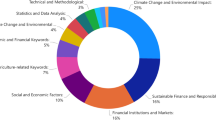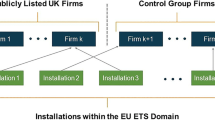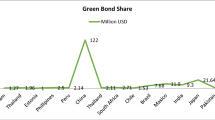Abstract
The promotion of renewable energy cannot be separated from the support provided by government subsidies. However, the effect of government subsidies is controversial. Taking China’s listed renewable energy companies as examples, this paper analyzes the impact of government subsidies on the financial performance of these companies. The results show that government subsidies do not promote improvements in corporate financial performance, and renewable energy companies are less profitable than other companies. The negative effect of government subsidies on corporate financial performance can be explained mostly by the rent-seeking behavior of firms. The occurrence of subsidy-induced overcapacity and adverse selection and moral hazard created by asymmetric information also weaken the incentive effect of government subsidies to some extent.

Source: State Grid Corporation of China, White Paper 2018 for the Promotion of New Energy
Similar content being viewed by others
Notes
New energy here includes wind, solar, nuclear, biomass, geothermal.
References
An T, Zhou S, Pi J (2009) The stimulating effects of R&D subsidies on independent innovation of Chinese enterprises. Econ Res J 44(10):87–98 (in Chinese)
Anderson M, Banker R, Huang R, Janakiraman S (2007) Cost behavior and fundamental analysis of SG&A costs. J Acc Audit Financ 22(1):1–28
Andor M, Voss A (2016) Optimal renewable-energy promotion: capacity subsidies vs. generation subsidies. Resour Energy Econ 45:144–158
Antoniou F, Strausz R (2017) Feed-in subsidies, taxation, and inefficient entry. Environ Resour Econ 67(4):925–940
Baron RM, Kenny DA (1986) The moderator-mediator variable distinction in social psychological research: conceptual, strategic, and statistical considerations. J Pers Soc Psychol 51(6):1173–1182
BP (2017) Statistical review of world energy. British Petroleum, London
Fan R, Feng X (2017) Local government subsidy strategy analysis for new energy vehicles under subsidies recession era. China Popul Resour Environ 27(3):30–38 (in Chinese)
Freedman LS, Graubard BI, Schatzkin A (1992) Statistical validation of intermediate endpoints for chronic diseases. Stat Med 11(2):167–178
Han X (2012) An analysis of the problem of overcapacity in China’s new energy industry and policy recommendations: taking the wind energy and solar energy industries as examples. Manag World 8:171–172 (in Chinese)
Hao H, Ou X, Du J, Wang H, Ouyang M (2014) China’s electric vehicle subsidy scheme: rationale and impacts. Energy Policy 73:722–732
Hong J, Koo Y, Jeong G, Lee J (2012) Ex-ante evaluation of profitability and government’s subsidy policy on vehicle-to-grid system. Energy Policy 42(42):95–104
IEA (2013) Energy Policies of IEA countries: Germany 2013 review. International Energy Agency, Paris
IPCC (2013) The fifth assessment report “climate change 2013: the physical science basis”. Intergovernmental Panel on Climate Change, Stockholm
Jiang F, Geng Q, Lu D, Li X (2012) Mechanism of excess capacity based on China’s regional competition and market distortion. China Ind Econ 6:44–56 (in Chinese)
Kalkuhl M, Edenhofer O, Kai L (2013) Renewable energy subsidies: second-best policy or fatal aberration for mitigation? Resour Energy Econ 35(3):217–234
Lin Y, Wu H, Xing Y (2010) “Wave Phenomena” and formation of excess capacity. Econ Res J 45(10):4–19 (in Chinese)
Liu G (2016) An analysis of the incentive effect of tax preference and fiscal subsidy policy: an empirical study based on the information asymmetry theory. Manag World 10:62–71 (in Chinese)
Metcalf GE (2010) Investment in energy infrastructure and the tax code. Tax Policy Econ 24(1):1–34
Murphy KM, Shleifer A, Vishny RW (1993) Why is rent-seeking so costly to growth? Am Econ Rev 83(2):409–414
Murray BC, Cropper ML, Chesnaye FCDL, Reilly JM (2014) How effective are US renewable energy subsidies in cutting greenhouse gases. Am Econ Rev 104(5):569–574
Nicolini M, Tavoni M (2017) Are renewable energy subsidies effective? Evidence from Europe. Renew Sustain Energy Rev 74:412–423
Reichenbach J, Requate T (2012) Subsidies for renewable energies in the presence of learning effects and market power. Resour Energy Econ 34(2):236–254
Ren S, Zhang J (2013) Subsidy, rent-seeking cost and markup rate: an empirical study based on Chinese equipment manufacturing firms. Manag World 10:118–129 (in Chinese)
REN21 (2017) Renewables 2017 global status report. Renewable energy policy network for the 21st Century, Paris
Rezai A, Ploeg FVD (2017) Second-best renewable subsidies to de-carbonize the economy: commitment and the Green Paradox. Environ Resour Econ 66(3):409–434
Rosnes O (2014) Subsidies for renewable energy in inflexible power markets. J Regul Econ 46(3):318–343
Sampedro J, Arto I, González-Eguino M (2018) Implications of switching fossil fuel subsidies to solar: a case study for the European Union. Sustainability 10(1):1–12
Schwanitz VJ, Piontek F, Bertram C, Luderer G (2014) Long-term climate policy implications of phasing out fossil fuel subsidies. Energy Policy 67:882–894
Shi X, Liu X, Yao L (2016) Assessment of instruments in facilitating investment in off-grid renewable energy projects. Energy Policy 95:437–446
Shi X, Chen H, Yu Y, Wen F (2018a) Development of variable renewable energy policy in developing countries: a case study of Sri Lanka. Int J Public Policy 14(1/2):10–29
Shi X, Rioux B, Galkin P (2018b) Unintended consequences of China’s coal capacity cut policy. Energy Policy 113:478–486
Sobel ME (1987) Direct and indirect effects in linear structural equation models. Soc Methods Res 16(1):155–176
Tang Q, Luo D (2007) An empirical study on the motivation and effects of government subsidy: evidence from Chinese listed companies. J Financ Res 6:149–163 (in Chinese)
Wang H, Miao X (2013) Research on the game theory of R&D subsidy for new energy vehicles in China. Soft Sci 27(6):29–32 (in Chinese)
Wang W, Ming J, Yue C (2014) Enterprise size, local government intervention and overcapacity. Manag World 10:17–36 (in Chinese)
Xia F, Song F (2017a) The uneven development of wind power in China: determinants and the role of supporting policies. Energy Econ 67:278–286
Xia F, Song F (2017b) Evaluating the economic impact of wind power development on local economies in China. Energy Policy 110:263–270
Yamamoto Y (2017) Feed-in tariffs combined with capital subsidies for promoting the adoption of residential photovoltaic systems. Energy Policy 111:312–320
Yang D, Chen Z, Nie PY (2016) Output subsidy of renewable energy power industry under asymmetric information. Energy 117:291–299
Yang J, Dong J, Hu L (2018) Design government incentive schemes for promoting electric taxis in China. Energy Policy 115:1–11
Yu D, Lu Y (2015) Government Improper intervention and overcapacity of strategic emerging industries: a case study of Chinese photovoltaic industry. China Ind Econ 10:53–68 (in Chinese)
Yu M, Hui Y, Pan H (2010) Political connections, rent-seeking, and the fiscal subsidy efficiency of local governments. Econ Res J 45(3):65–77 (in Chinese)
Yu F, Guo Y, Le-Nguyen K, Barnes SJ, Zhang W (2016) The impact of government subsidies and enterprises’ R&D investment: a panel data study from renewable energy in China. Energy Policy 89:106–113
Zhang H, Sheng Z, Meng Q (2015) The government subsidies mechanism for market development of new energy vehicle. J Manag Sci 28(6):122–132 (in Chinese)
Zhang H, Zheng Y, Ozturk UA, Li S (2016) The impact of subsidies on overcapacity: a comparison of wind and solar energy companies in China. Energy 94:821–827
Zhao C, Wang Z, Yang D, Cao W (2015) Research on the catering behavior of enterprise and government subsidy performance: based on the analysis of the enterprise’s profitability. China Ind Econ 7:130–145 (in Chinese)
Zheng Y, Zhu Y (2013) Bank lending incentives and firm investment decisions in China. J Multinatl Financ Manag 23(3):146–165
Zhong T, Du R (2015) A Research of subsidies for new energy vehicles based on game theory. Chin J Manag Sci 23((SI)):817–822 (in Chinese)
Zhou Y, Pu Y, Chen S, Fang F (2015) Government support and development of emerging industries: a new energy industry survey. Econ Res J 50(6):147–161 (in Chinese)
Acknowledgements
This work is supported by funding from National Natural Science Foundation of China (Nos. 71673026, 71642004, 71521002, 71322306, 71273027), China’s National Key R&D Program (2016YFA0602801), Joint Development Program of Beijing Municipal Commission of Education and the Fundamental Research Funds for the Central Universities. We appreciate the comments and constructive suggestions from the anonymous referees.
Author information
Authors and Affiliations
Corresponding author
Rights and permissions
About this article
Cite this article
Zhu, Z., Liao, H. Do subsidies improve the financial performance of renewable energy companies? Evidence from China. Nat Hazards 95, 241–256 (2019). https://doi.org/10.1007/s11069-018-3423-8
Received:
Accepted:
Published:
Issue Date:
DOI: https://doi.org/10.1007/s11069-018-3423-8




